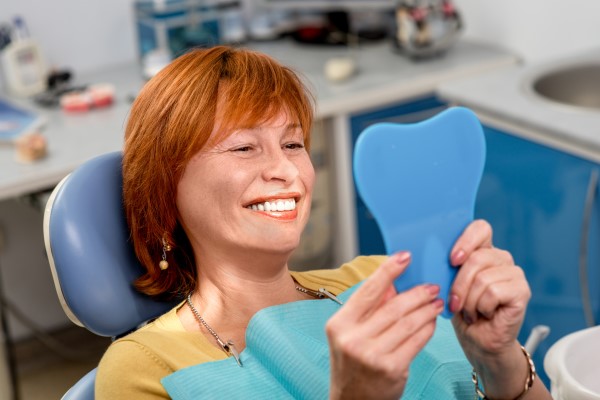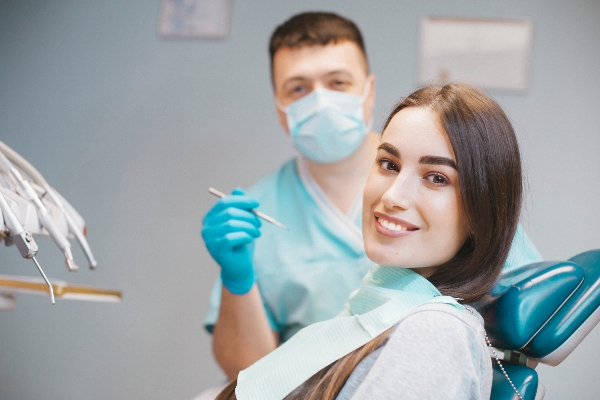What Your Dentist Wants You to Know About Adjusting to New Dentures

Adjusting to new dentures can take a few weeks, but once a patient has adjusted, it is easier to eat and smile with confidence. For those who have had tooth loss corrected through dentures, it can take some time before things feel normal inside the mouth. Dentures feel and function differently than natural teeth. They often irritate the gums and leave wearers struggling to figure out how to adjust. Before getting overwhelmed with the different feelings that dentures present when speaking or eating, remember this advice from a dentist.
Discomfort will be normal
Many assume that the pain, irritation, and discomfort felt in the early days and weeks of wearing new dentures is not normal. It can take an average of 30 days before fully adjusting to the sensations and pressure of wearing new dentures, and it is important not to rush trying to get back to normal. The soft tissues and gums need to get used to the feeling of constant contact with the base of the dental appliance. Even though there is a layer of protective cushioning on the bottom of the dentures, there may be some discomfort when chewing or speaking.
The gums will need time to heal, and the jawbone will learn to adjust to eating without deep bone pressure. However, as there are no teeth to continually stimulate the jawbone and prevent bone loss, the jawbone will eventually shift position, and discomfort can result. This is why dentures may periodically need to be adjusted by a dentist.
Readjust as necessary
Your mouth has to become accustomed to holding the dentures into place. The prosthetics may feel loose in the first several weeks. In fact, you may find that they pop out of place now and then. Stay patient with the dentures and remind yourself that this phase will not last. Instead, just reposition with care and carry about your day. Do not forget to attend your follow-up appointments to ensure that you do not need further adjustments.
Alleviate pain and discomfort
While discomfort is normal when you have dentures for the first time, there are methods to alleviate the pain and discomfort. Give your gums a massage to increase blood flow to the area. As circulation increases, swelling decreases. Whenever you remove the dentures, swish warm salt water in your mouth. Not only does salt water reduce inflammation, but it can reduce soreness too. There are also topical creams available to relieve soreness. To help soothe the gums, apply aloe vera to the dentures.
Dietary habits need to change
In addition to adjusting to new dentures by knowing what to expect, it is important to understand the impact dietary choices may have on the adjustment process. The new equipment may cause some embarrassment or frustration, as it is possible to accidentally scrape the gums, bite the tongue, or pop the dentures out of the mouth while learning how to chew with the false teeth. It may be helpful to practice at home until a level of confidence has been developed. A dentist may also make the following recommendations in order to make things more comfortable during the transition period.
Select soft foods
To give the mouth an opportunity to move the mouth comfortably with new teeth, start with soft foods. Foods like pudding, applesauce, or mashed potatoes will not put too much pressure on the gums, which allows them to heal while the mouth and jaw get into the routine of eating with dentures in place. While soups and broth are soft foods, dentures can make the gums more sensitive to hot and cold sensations and should be eaten carefully.
Bite carefully
Use small bites when advancing to tougher foods. A safe practice is to start chewing with the back teeth rather than the front teeth. Biting into the wrong foods with the front teeth can cause the dentures to shift across the back teeth. Small, bite-sized pieces in the back of the mouth or along the sides put more even pressure on the jaws and dentures.
Conclusion
Dentures do function similarly to your natural teeth. However, there is still a learning curve. Understanding that there is a period of adjustment can help you remain patient and stick with the process. These tips for adjusting to new dentures can spare a patient from extreme discomfort or worry. For more help with denture-related concerns, schedule an appointment with a dentist.
Request an appointment here: https://www.mysaratogadentist.com or call My Saratoga Dentist PLLC at 5186753094 for an appointment in our Saratoga Springs office.
Check out what others are saying about our dental services on Yelp: Dentures and Partial Dentures in Saratoga Springs, NY.
Recent Posts
Dentures can restore normalcy to the functions of chewing and eating, but for first-time wearers, there is a period spent adjusting to new dentures. By asking a dentist about this transitionary period, it is possible to minimize the discomfort and awkward mishaps that often accompany getting used to a new dental appliance. In addition, dealing…
Removable artificial teeth are called dentures. They replace permanent teeth lost or extracted due to damage or extensive decay. False teeth are a traditional dental restoration method that has been around for centuries and is still effective today. However, there are things you need to know about them before you start wearing them.Your dentist can…
There are many treatments available to restore missing teeth, dentures are among the most common. They consist of appliances that are usually removable and consist of a base of hard acrylic or metal that supports artificial teeth. Their purpose is to restore oral function so that you can talk and eat more or less the…
Partial dentures are a popular replacement option for missing teeth. You could potentially benefit from them if you have lost some of your permanent teeth, but there are still some healthy ones that remain in the jaw. Your dentist can explain if you are a candidate for partials. If you are, you should learn all…


